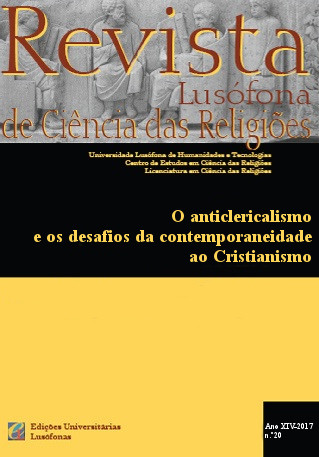A Geração de 70 e o Anticlericalismo
Resumo
Resumo
A temática religiosa, quase sempre com uma característica anticlerical, é uma constante na Literatura Portuguesa, desde o período medieval até a contemporaneidade. Neste trabalho espero traçar algumas reflexões sobre o anticlericalismo nessa literatura e como ele se configura nas obras de alguns de seus autores. Buscarei, por intermédio de uma contextualização histórica, analisar preliminarmente de que forma os autores de diversos períodos dialogavam com a Igreja e seus representantes, o clero. Darei ênfase à maneira pela qual a Geração de 70, grupo intelectual da segunda metade do século XIX, lidou com a crítica anticlerical, uma vez que, para esses intelectuais, a Igreja Católica constituía-se um dos fatores que teriam levado Portugal à situação decadente, que eles pretendiam denunciar e criticar.
Palavras-Chave: Literatura Portuguesa; Anticlericalismo; Geração de 70; Século XIX; Igreja Católica.
Abstract
The religious theme, almost always carries an anticlerical feature, finds a common ground in the Portuguese Literature, from the medieval period to the contemporaneity. In this work I hope to share some thoughts upon the anticlericalism in this literature and how it is shown in the works of their authors. I will analyse preliminarily through a historical contextualization the way the authors from several periods dialogued with the Church and its representatives, the Clergy. Enphasis will be given on the way in which the seventies Generation, intellectual group from the second half of the nineteenth century, dealt with the anticlerical criticism. The Catholic Church,for these intellectuals, represented one of the factors which led Portugal to a declining situation , a fact they intended to denounce and criticize.
Keywords: Portuguese Literature; Anticlericalism; The seventies Generation; Nineteenth century; Catholic Church.



